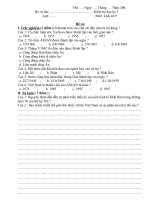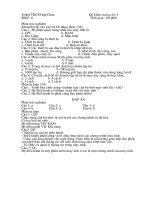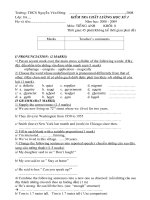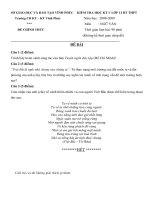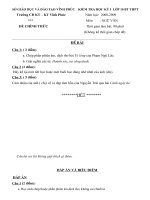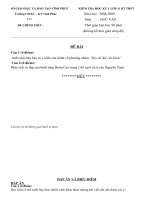ĐỀ KIỂM TRA HKI U1-7 K10 (Theo Chương trình chuẩn)
Bạn đang xem bản rút gọn của tài liệu. Xem và tải ngay bản đầy đủ của tài liệu tại đây (65.49 KB, 4 trang )
Trang 1/4 - Mã đề thi 768
Trường THPT Phan Đình Phùng
ĐỀ THI CHÍNH THỨC
(Đề gồm có 04 trang)
ĐỀ KIỂM TRA HỌC KỲ I NĂM 2011
Môn thi: ANH VĂN 10 – Chương trình chuẩn
Thời gian làm bài: 60 phút; Không kể thời gian phát đề.
Mã đề thi 768
Họ, tên học sinh:
Số thứ tự:
ĐỀ THI GỒM 40 CÂU (TỪ QUESTION 01 ĐẾN QUESTION 40)
Mark the letter A, B, C, or D on your answer sheet to show the underlined part that needs
correction in each of the following questions.
Question 1: Be sure to make a real effort to answer all the questions the interviewer asked.
A B C D
Question 2: In the first part of the twentieth century, before a TV set was a part of
A
most households, radio programming was different with what it is now.
B C D
Question 3: It used to be one of the most popular programme shown on TV at the time.
A B C D
Question 4: There is so many traffic on Queen Street and it is predicted that there will be a jam
A B C
for 2 hours.
D
Question 5: Workers are not allowed using the office phone for personal calls.
A B C D
Mark the letter A, B, C, or D on your answer sheet to indicate the word whose underlined
part is pronounced differently from that of the rest in each of the following questions.
Question 6: A. bird B. early C. learning D. teacher
Question 7: A. ought B. through C. bought D. thought
Question 8: A. strange B. disabled C. radio D. appropriate
Read the following passage taken from Cool Zone 8, Texto Editores 2009, and mark the
letter A, B, C, or D on your answer sheet to indicate the correct word for each of the
blanks from 9 to 13.
Kate, 14: I think TV (9)______ a great source of information. I know most teens don’t like
watching the news, but I do. I like to know what is happening around our world. I also enjoy
(10)______, especially about wildlife. I’m very curious about the way animals live and what is
being done to preserve their species. I have always a lot of fun watching TV. Another great
thing about TV is that I can listen to my favourite music and watch the video clips at the same
time. I also enjoy (11)______ live shows and films, mostly comedy and thrillers, though I also
like watching dramas now and then. I watch TV two to three hours a day.
Rachel, 17: I like TV as everybody else, but since I have done some research work for
school I’ve become more selective about the programmes I watch. I like watching the news and
some game shows like “Who wants to be a millionaire?”, so I don’t really (12)______ too much
time in front of the box, an hour or two a day I’m more aware now of the good and not so
good effects of TV. Some programmes are educational and help us to develop and use our
Trang 2/4 - Mã đề thi 768
imagination, but many are full of violence. There are also so many soaps and reality shows
(13)______ make people forget that there is a real world out there to experience.
Question 9: A. was B. has become C. will be D. had been
Question 10: A. comedies B. documentaries C. news D. cartoons
Question 11: A. meeting B. to watch C. watching D. to meet
Question 12: A. send B. spend C. give D. offer
Question 13: A. that B. about which C. which they D. who
Read the following passage taken from English workbook 10 published by Vietnam
Education Publisher, and mark the letter A, B, C, or D on your answer sheet to indicate
the correct answer to each of the questions from 14 to 21.
Probably the most widely recognised conversational convention is that people take turns
speaking. But how do people know when it is their turn? Some rules must be present, otherwise
conversations would be continually breaking down into a disorganised jumble of interruptions
and simultaneous talk.
Turn-taking cues are usually quite subtle. People do not simply stop talking when they are
ready to yield the floor. They usually signal in advance that they are about to conclude. The
clues may be semantic (“So anyway,…” or “Last but not least, …”); but more commonly the
speech itself can be modified to show that a turn is about to end – typically, by lowering its
pitch, loudness, or speed.
Body movements and patterns of eye contact are especially important. While speaking, we
look at and away from our listener in about equal proportions; but as we approach the end of a
turn, we look at the listener more steadily.
Listeners are not passive in all of this. Here too there are several ways of signaling that
someone wants to speak next. One way is through an observable increase in body tension – by
leaning forward or producing an audible intake of breath. A less subtle approach is simply to
interrupt – a strategy that may be tolerated, if the purpose is to clarify what the speaker is
saying, but that more usually leads to social disapproval.
Question 14: For the conversations to be smooth, there must be ______.
A. some rules of speaking turns B. conversational conventions
C. organised jumbles D. wide recognition
Question 15: People do not simply stop talking when they are ready ______.
A. to break down into disorganised jumble B. to recognise speech
C. to talk about another topics D. to finish speaking
Question 16: “So anyway,…:” or “Last but not least, …” are phrases to signal ______.
A. in advance B. conclusions C. interruptions D. turn-taking cues
Question 17: The word “modified” in paragraph 1 could be best replaced by ______.
A. changed B. broken C. turned D. concluded
Question 18: Nearly to the end of the speech, speakers tend to ______.
A. use more eye contact B. look away in about equal proportions
C. have steady look at the listener D. speak more quickly
Question 19: The word “tolerated” in paragraph 3 is closet in meaning to ______.
A. encouraged B. accepted C. hard-to-forgive D. forgotten
Question 20: An audible intake of breath is ______.
A. a passive way of signaling next turn
B. like leaning forward
C. one way to signal that you want to speak next
D. body tension
Question 21: Which of the following is NOT true according to the passage?
A. Many people usually accept interruptions when someone is speaking.
B. Body movements and eye contact are very important when speaking.
Trang 3/4 - Mã đề thi 768
C. Using signal cues is not the only way to inform that the speakers are to conclude.
D. It is widely agreed that people take turns speaking in conversational convention.
Mark the letter A, B, C, or D on your answer sheet to indicate the word or phrase that is
closest in meaning to the underlined part in each of the following questions.
Question 22: He’s very accurate in his calculations.
A. correct B. magical C. tragic D. determined
Question 23: What is Kate worried about?
A. proud B. scenic C. satisfied D. anxious
Question 24: I am disappointed that my first plan was bitterly opposed.
A. completely allowed B. slowly transmitted
C. poorly attended D. strongly disapproved
Mark the letter A, B, C, or D on your answer sheet to indicate the correct answer to each
of the following questions.
Question 25: Andrew: “______”
John: “Yes, once a month.”
A. How often do you go for a picnic? B. Why do you go for a picnic?
C. Do you often go for a picnic? D. When do you go for a picnic?
Question 26: The company ______ in 1988 and now has expanded to large corporation.
A. has established B. established
C. has been established D. was established
Question 27: Ann invited me to join the party, ______ surprised me.
A. it B. which C. and D. that
Question 28: Bob and Jen ______ each other since university.
A. knows B. had known C. knew D. have known
Question 29: Marry suggested ______ Professor Day’s class on Biology.
A. to be taken B. to take
C. that everyone takes D. taking
Question 30: My strict Maths teacher doesn’t ______ talking in class. Even small talks are to
be punished.
A. allow B. let C. permit D. like
Question 31: Nam, ______ I go, is the best friend of mine.
A. he who B. that C. with whom D. who
Question 32: I really ______ my teaching career because I like to work with children.
A. realise B. store C. enjoy D. share
Question 33: After working for nearly 3 hours, I decided to take a ______.
A. thought B. transplanting C. chat D. rest
Question 34: ______ he took a taxi, Bill still arrived late for the concert.
A. Because of B. Although C. In spite of D. Because
Question 35: Elma: “______ are you going?”
Tracy: “To the supermarket.”
A. How B. What C. Where D. Why
Question 36: Life is bound to be difficult for ______.
A. employment B. employers C. the employed D. the unemployed
Question 37: Watching ______ programmes is my hobby, as it informs me about the latest
things happening around us.
A. news B. comedy C. drama D. cartoon
Question 38: So we decide that party at Ann’s house and we have to get her parents’ ______.
A. permission B. friendliness C. excursion D. formation
Trang 4/4 - Mã đề thi 768
Question 39: Mathew is a good student as a result of her ______ of self-study.
A. permission B. transmission C. disability D. capability
Question 40: ______ your sister at the airport at 3 o’clock?
A. Will you meet B. Are you meeting C. Have you met D. Do you meet
Question 41: My house is very ______ school so my parents have to take turns to ride me
there every day.
A. away from B. near C. far from D. beside
Question 42: I have just finished my exams and I have a few days ______ before the next
semester.
A. off B. on C. out D. away
Question 43: We are now having problems with our house ______ security.
A. safely B. safe C. safety D. unsafe
Question 44: Jake ______ degree in Business and Management with flying colours.
A. took pride in B. obtained C. earned D. received
Question 45: Our company takes on applicants aged ______ 30 and 35 for this position.
A. at B. between C. both D. from
Mark the letter A, B, C, or D on your answer sheet to indicate the sentence that is closest
in meaning to each of the following questions.
Question 46: We last saw Tom 7 years ago.
A. The last time we saw Tom was 7 years ago.
B. We have never seen Tom for 7 years.
C. We haven’t seen Tom since 7 years.
D. The last time we saw Tom 7 years ago.
Question 47: We have been told not to do this alone.
A. They have told us not to do this alone.
B. They haven’t told us to do this alone.
C. We have been telling them not to this alone.
D. Someone has not told us to do this alone.
Question 48: I find it strange that Japanese don’t look at me when talking.
A. I used to find that Japanese don’t look at me when talking.
B. I am not used to the fact that Japanese don’t look at me when talking.
C. I didn’t use to find that Japanese don’t look at me when talking.
D. I am getting used to that Japanese don’t look at me when talking.
Question 49: I usually sleep for an hour in the afternoon.
A. My sleep in the afternoon usually last an hour.
B. I usually spend an hour on sleep in the afternoon.
C. Sleeping in the afternoon usually took me an hour.
D. It takes usually me an hour to sleep in the afternoon.
Question 50: The boy is going to travel with me. You saw him sitting next to yesterday.
A. The boy that you saw him sitting next to me yesterday is going to travel with me.
B. The boy who is going to travel with me you saw next to me yesterday.
C. The boy with whom I am going to travel you saw next to me yesterday.
D. The boy who you saw next to me yesterday is going to travel with me.
THE END



